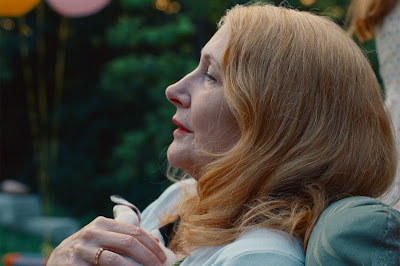One of the first questions I asked myself about Monica (2022, directed by Andrea Pallaoro) as the projectionist closed the curtains to narrow the screen was, "why is this in the Academy ratio?"* The flippant answer I gave myself is that transgender people don't get widescreen epics. Upon reflection, that's not far off. The frame of the film constrains its central character as much as her circumstances. It creates a claustrophobic space for her to exist in with no obvious room to transcend that space. The second question I asked myself, mid-film, was "why is this character a sex worker?" I know the answer to that, too, but it would be a huge relief to see a film about a trans woman who wasn't a sex worker. No shade toward sex workers, or trans women who are sex workers, but I think I can name three films this century where a trans woman character wasn't a sex worker when her occupation was known to the audience. Maybe. The third question, and it's one I asked about the similar A Fantastic Woman a few years ago, was, "is there no possibility for joy for this character?" Monica veers perilously close to trans misery porn. But then its B-plot is about a woman dying of brain cancer, so these things are relative.
Monica is in the middle of a bad break-up where the man she loves is ghosting her even as she leaves him message after message. When the phone finally rings, it's not the boyfriend, but her sister in law, Laura, who has tracked her down to tell her that her mother has terminal brain cancer. The same mother who disowned Monica and left her at a bus station as a teen with the words, "I can't be your mother anymore." Monica leaves Los Angeles and travels to her mother's house in the east, where her mother doesn't recognize her. Monica takes on the burden of caring for her mother when the daytime care-giver goes home. Meanwhile, Monica needs to earn a living, and her attempts to perform on cam or meet paying men while at her mother's house are both fraught and unproductive. She also becomes re-acquainted with her brother and his family, and feels a tug of longing for a family that accepts her. She enjoys the company of her brother's children, playing the role of "Aunt Monica." After a particularly bad experience with a potential client, Monica sneaks into her mother's room at night and falls asleep next to her. For Monica's mother, Eugenia, every day is a struggle and a confusion, but she begins to piece together Monica's identity...
Monica maintains the morbid fascination cis filmmakers have with trans bodies and transness in general, though in its defense, it has moved past the transition narrative and its insistence on the transformation. The film mercifully never shows us Monica's past self, a depiction that maybe has an understanding that the trans person in the present is probably who that person was in the first place. It still holds to the identifiers of trans cinema, though. We are shown Monica shooting her hormones into her thigh, we are shown what she looks like without clothes, we see her putting on make-up, and we often see her framed in mirrors. Moreover, we don't generally see her happy, which is a key component of cis filmmakers' understanding of trans lives. There's a point late in the film when Monica's brother tells her that, "I don't know anything about your life," which seems remarkably, if accidentally, self-aware. The pathetic trans person is one of the key archetypes of trans-feminine depiction. So is the trans sex worker, which also gets a workout here in two scenes: one in which Monica is interrupted from a cam show by her mother's needs in the night; the other in an extended sequence in which the "date" she has arranged stands her up and she winds up fucking a truck driver in the back of his rig. At least she's not depicted as a psychopath or an object of ridicule, though I suspect those depictions will be returning to movies given the current political climate. Monica's sex work is a key component of her misery. Both instances are unfulfilling for her and presumably thwart her need for money. God knows, we can't show sex workers living fulfilled lives, either, if you'll pardon the sarcasm. There's a stiff puritanism in both the film's awareness of sex work and of transgender lives, and a lack of imagination, too. This isn't surprising. Just disappointing.
What humanity this film grants its central character is almost entirely provided by Trace Lysette. The character arc she plays in the film mirrors her own public biography of estrangement from her family, so it would be easy to dismiss her performance as "playing herself." But she goes beyond that. She manages to imbue Monica with both a dignity and an interiority that frankly isn't there in the screenplay. It's a performance that's a rebuke to every cis person playing trans, because there are nuances in the way she holds her body and controls her voice, as well as a barely contained rage at the world behind a learned stoicism that would absolutely elude a cis actor who might distill transness down to surface tics. They're visitors and dilettantes, after all. Lysette is an inhabitant, which makes all the difference. And she's not playing against lightweights. Her opposite number is Patricia Clarkson as her mother. Clarkson is a formidable actor and she has a part that's showy: a woman dying of brain cancer who is losing her grip on her memory and her surroundings. Clarkson underplays her role, rather than providing an award-bait barnstormer. When she eventually comes to a recognition, it's a moment of grace rather than an opportunity for overbearing the audience. The filmmakers, to their credit, leave this moment ambiguous enough.
The film's underlying structure is compelling. It's a story that has deep mythological roots, whether in the Biblical story of the prodigal son or in Shakespeare's King Lear. Every generation strains at the disapproval of the generation that comes before, though perhaps not in such stark terms as a family who expels a queer child from the covenant between parents and children. That extreme makes for a story of high tragedy, and both Lysette and Clarkson are both more than capable of playing the notes that make its primal nature resonate with an audience. If anything, the way the filmmakers behind the camera have styled the film hinders the central story. Long takes and the lack of a score may seem like discipline, but this particular film could stand for some melodrama. I mean, there are shots and moments in the film of great emotional power. The scene when Eugenia realizes why Monica is sleeping next to her. The scene where Monica and her brother discuss her life after leaving the family while standing in their childhood home's derelict swimming pool. The rage Monica expresses when her car breaks down and adds that little extra misery on a life already drenched in misery. The style of the film muffles the impact of these scenes. Sometimes a little. Sometimes a lot.
The filmmakers back away from the misery of their lead character at the end of the film. Grudgingly, it seems. There are two scenes that suggest a path toward joy not only for Monica but maybe beyond her. In the first, her niece and nephew are playing at the act of giving birth, using a doll for a prop. Significantly, it's the nephew with the doll wedged between his legs. Monica eavesdrops on their play and barges in to join them. This is highly gendered play. The film seems to be welcoming a future with less rigidly defined gender roles. In the second scene, the last scene in the film, Monica's nephew is giving a musical performance at a school graduation ceremony (it's the end of the sixth grade for him). Monica gives him pointers on owning the stage and slips him the music box she's had since childhood. As she watches with his parents, the rapprochment is tentatively complete. It's quite a change from the woman whose first instinct when Laura calls her is to ask her how she got her number. Maybe, just maybe, there's a family for Monica after all...
...which strikes me as weird. Because queer people of every stripe have been drawn to "found" families for years and trans people in particular have communities around them. Trace Lysette herself found her own community with the Ballroom culture in New York when she was young. So the insistence on a rapprochement between Monica and her biological family--a family that deliberately exiled her--seems both tone deaf to the lives of actual queer people and more than a little victim blame-y. It also feels weird that Monica is so profoundly alone in the first part of the film. Even the guy who harasses her in her car is entirely off camera. The narrow framing serves not just to constrain her actions, but to isolate her. The movie goes out of its way to arrange her life so that she needs her reconciliation with her family or else she'll be alone forever. This undercuts what grace it deigns to bestow upon her in the end. It's biological family or the bush. For a film that aims to be trans positive, it sure is conservative in its underlying social politics.
I don't know. I have complex feelings about this movie, and some of them are me assembling the film I'd like to see in my head rather than responding to the one I actually saw. It's not fair to the film. Don't get me wrong, I like Trace Lysette in the role and think the film is worth seeing for her. For Patty Clarkson, too. But it nags at me that this is really just more of the same from cis filmmakers trying to sympathize with us poor difficult trans folks.
Anyway, happy Pride.
*Academy ratio is traditionally 1.33 to 1. Old Hollywood movies before the 1950s were in this ratio. Old televisions, too. It is unusual to see it on new movies.

This blog is supported on Patreon by wonderful subscribers. If you like what I do, please consider pledging your own support. It means the world to me.




No comments:
Post a Comment